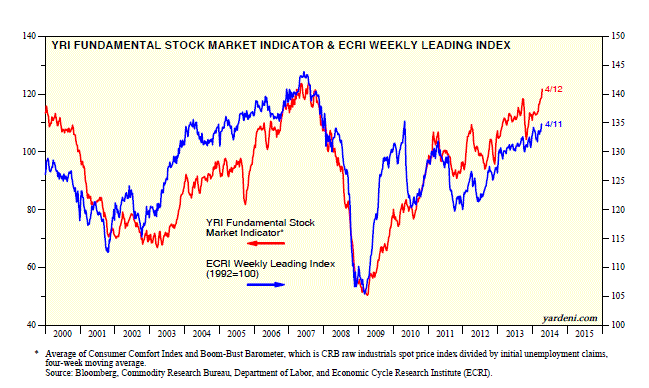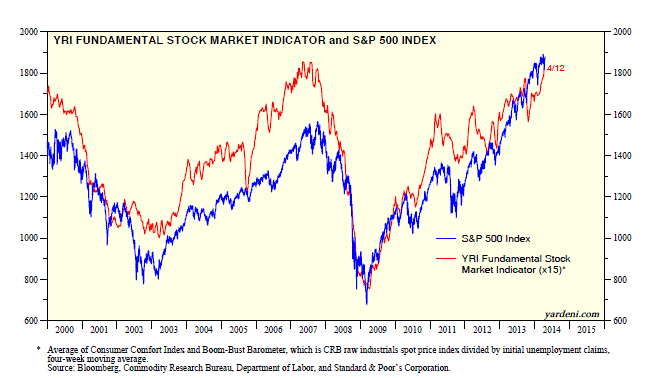I’ve previously made the case for a secular bull market in stocks on the premise that subpar economic growth in the US and around the world reduces the likelihood of a recession. That’s because slow growth is bound to keep a lid on inflation, which means that the major central banks are more likely to maintain their easy monetary policies. In the past, maturing economic expansions often ended when inflationary booms caused monetary policy to tighten. The boom was then followed by a bust.
That’s not happening this time. The 4/20 WSJ included an interesting article titled, “Sluggish Economic Recovery Proves Resilient.” It reviews the various possible explanations for why the current recovery “is proving to be one of the most lackluster in modern times.” Nevertheless, “[i]t also is shaping up as one of the most enduring.”
The Business Cycle Dating Committee of the National Bureau of Economic Research determines the length of economic expansions and contractions (table). The current economic expansion just matched the 58.4 months average length of the previous 11 expansions since World War II. So far, real GDP is up 11.0% since Q2-2009, the trough of the last recession. That’s the weakest recovery of the previous six. That’s mostly attributable to the subpar recovery in real personal consumption expenditures.
So why is the recovery so slow? The article notes that Republicans blame Democrats for burdening the economy with taxes, debt, and regulations. Democrats blame Republicans for not agreeing to more fiscal spending and for playing a game of chicken with the debt ceiling. Economists are also a disagreeable lot, with some saying that the financial crisis of 2008 is still weighing on the economy. Others see “secular stagnation.” Not mentioned in the article was income inequality, which has recently become one of the main explanations of progressive economists.
I tend to side with the conservatives. I’ve frequently marveled at the resilience of the US economy notwithstanding the meddling of the federal government. I also believe that powerful deflationary forces have been unleashed by the proliferation of globalization and technological innovations. They are keeping a lid on inflation, which lowers the likelihood of a recession caused by tight money conditions.
Meanwhile, there’s certainly no hint of a recession in the Index of Leading Economic Indicators, which rose in March to a new cyclical high, and the highest reading since December 2007. The Index of Coincident Economic Indicators has been in record-high territory since last summer, and rose to yet another new high last month.
That’s not happening this time. The 4/20 WSJ included an interesting article titled, “Sluggish Economic Recovery Proves Resilient.” It reviews the various possible explanations for why the current recovery “is proving to be one of the most lackluster in modern times.” Nevertheless, “[i]t also is shaping up as one of the most enduring.”
The Business Cycle Dating Committee of the National Bureau of Economic Research determines the length of economic expansions and contractions (table). The current economic expansion just matched the 58.4 months average length of the previous 11 expansions since World War II. So far, real GDP is up 11.0% since Q2-2009, the trough of the last recession. That’s the weakest recovery of the previous six. That’s mostly attributable to the subpar recovery in real personal consumption expenditures.
So why is the recovery so slow? The article notes that Republicans blame Democrats for burdening the economy with taxes, debt, and regulations. Democrats blame Republicans for not agreeing to more fiscal spending and for playing a game of chicken with the debt ceiling. Economists are also a disagreeable lot, with some saying that the financial crisis of 2008 is still weighing on the economy. Others see “secular stagnation.” Not mentioned in the article was income inequality, which has recently become one of the main explanations of progressive economists.
I tend to side with the conservatives. I’ve frequently marveled at the resilience of the US economy notwithstanding the meddling of the federal government. I also believe that powerful deflationary forces have been unleashed by the proliferation of globalization and technological innovations. They are keeping a lid on inflation, which lowers the likelihood of a recession caused by tight money conditions.
Meanwhile, there’s certainly no hint of a recession in the Index of Leading Economic Indicators, which rose in March to a new cyclical high, and the highest reading since December 2007. The Index of Coincident Economic Indicators has been in record-high territory since last summer, and rose to yet another new high last month.
3rd party Ad. Not an offer or recommendation by Investing.com. See disclosure here or
remove ads
.
Our Fundamental Stock Market Indicator (FSMI), which tends to track the ECRI index, jumped 7.7% over the past eight weeks to a new cyclical high that nearly matches the previous peak during 2007. That’s a good omen for the stock market, since our FSMI is even more highly correlated with the S&P 500.
Today's Morning Briefing: Moving Forward, Slowly. (1) Q1 earnings growth turns slightly negative. (2) The upbeat Tale of Three Cities. (3) Forward earnings still moving forward. (4) Might slow growth be bullish for valuations? (5) No boom, no bust. (6) Dating Committee data show expansion set to exceed average length. (7) No recession in leading indicators, including ECRI weekly. (8) Our Fundamental Stock Market Indicator is bullish.


